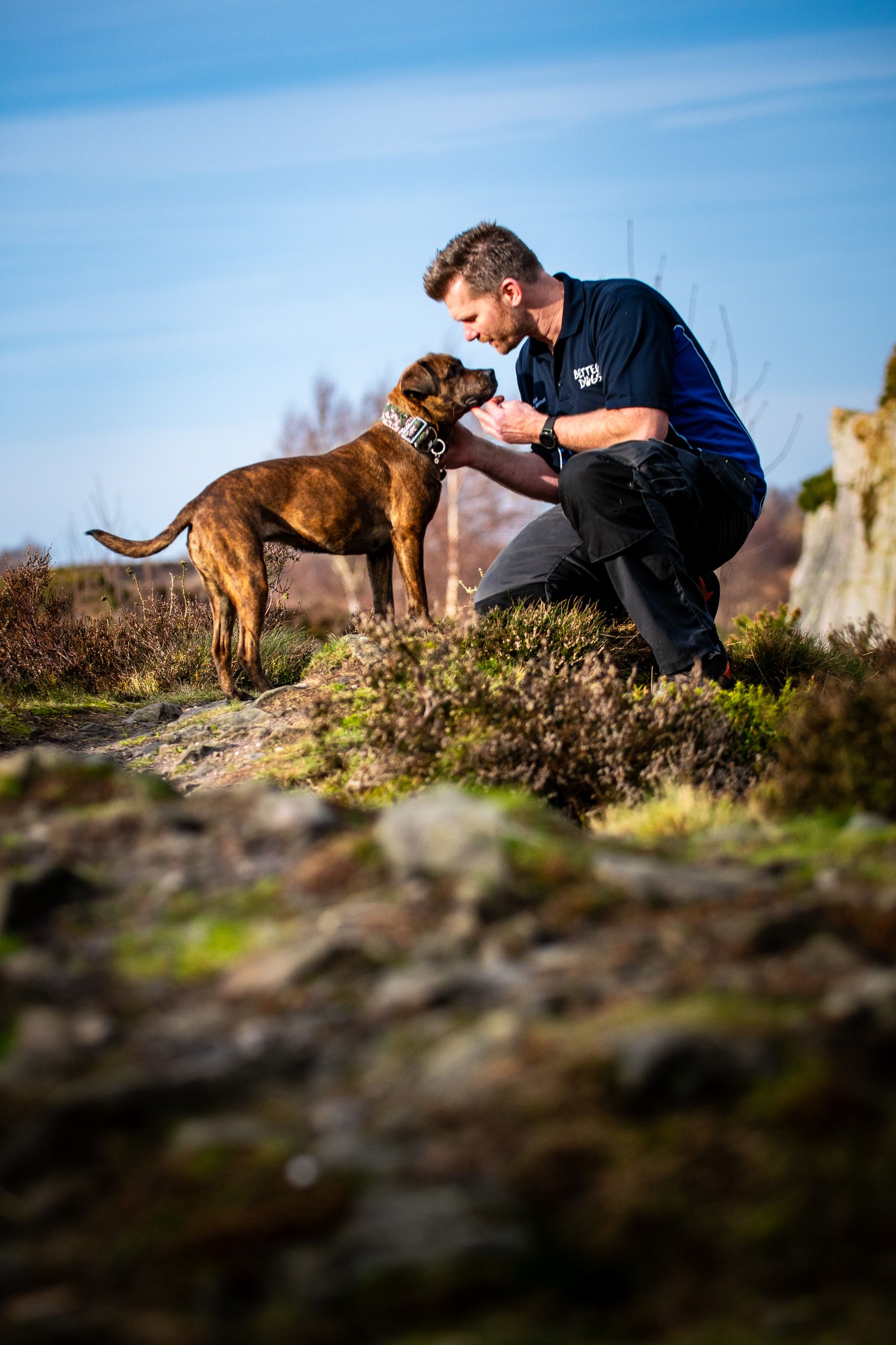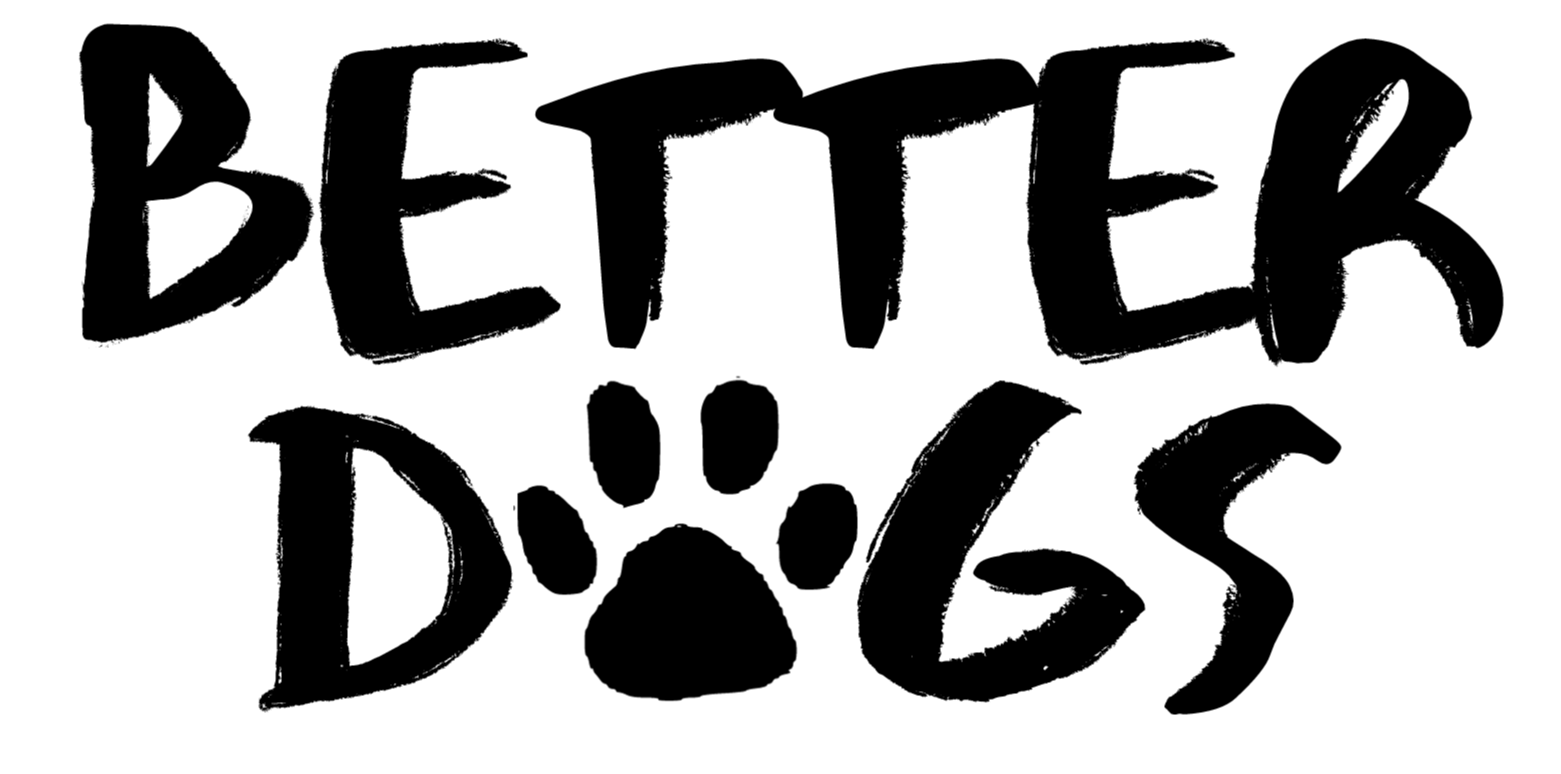
About Better Dogs

About Better Dogs
Write your awesome label here.
Write your awesome label here.
Write your awesome label here.
Our Story
Our story began with our reactive dog Louie
It began with a snap when someone came to say hello to him. Then growling at other dogs. Eventually his first bite while resource guarding. We tried everything we could find: trainers, courses, books, medication, groups (so much conflicting advice!), but his reactivity just seemed to get worse and worse.
After a few reactive episodes we stopped having anyone over. We were too stressed to take him with us visiting family, and holidays became a thing of the past.
We tried rehoming him, but even after a long careful handover his new owners couldn't deal with his reactive behaviour. After another bite we were told he should be put down, but we wanted to give Louie one last chance.
After a few reactive episodes we stopped having anyone over. We were too stressed to take him with us visiting family, and holidays became a thing of the past.
We tried rehoming him, but even after a long careful handover his new owners couldn't deal with his reactive behaviour. After another bite we were told he should be put down, but we wanted to give Louie one last chance.
We then met Adam, who specialises in Last Chance Dogs
We then met Adam to help us with our dog's reactivity, and we were blown away by the results! Adam's method was long-lasting, fitted into our daily routine and gave us the freedom we were missing.
Adam is a certified clinical dog behaviourist with 20+ years working with the most difficult reactive dogs, that are faced with being signed into a rescue centre, or being euthanised due to their behavioural issues.
Working with the most challenging dogs both at NCAR rescue and privately means he has seen it all, and developed effective techniques that will transform your dog.
Adam is a certified clinical dog behaviourist with 20+ years working with the most difficult reactive dogs, that are faced with being signed into a rescue centre, or being euthanised due to their behavioural issues.
Working with the most challenging dogs both at NCAR rescue and privately means he has seen it all, and developed effective techniques that will transform your dog.

So we decided to start Better Dogs together
Adam is a CFBA-certified clinical canine behaviourist
Did you know that dog trainers don't need to obtain any qualifications or certifications? No wonder they all give conflicting advice! That's why only certified clinical canine behaviourists are used for vet referrals, and why insurance companies will often cover their fees.
Here are some of the qualifications Adam has completed in his years of learning about canine behaviour.
Here are some of the qualifications Adam has completed in his years of learning about canine behaviour.
Adam's Qualifications
Advanced Canine Behaviour & Psychology Diploma
Pet Education Training & Behaviour Council of Great Britain.
“This diploma is accredited by the PETbc and recognised in the UK as the premier qualification for canine behaviourists, trainers and instructors. Holders of this Diploma will be acknowledged as being highly competent within their field of expertise” – Pet Education Training & Behaviour Council of Great Britain.
“This diploma is accredited by the PETbc and recognised in the UK as the premier qualification for canine behaviourists, trainers and instructors. Holders of this Diploma will be acknowledged as being highly competent within their field of expertise” – Pet Education Training & Behaviour Council of Great Britain.
Canine Communication Diploma (Distinction)
Compass Education and Training covering subjects such as; what makes a social animal, acoustic communication, body language, visual communication, communication via scent, taste and why touch is important to canines.
“This diploma is designed to equip the student with the knowledge to ‘read’ and understand how and what dogs communicate to each other and to humans. This is essential if one is to be working with dogs or engaged in training or behaviour therapy.” – Compass Education and Training.
“This diploma is designed to equip the student with the knowledge to ‘read’ and understand how and what dogs communicate to each other and to humans. This is essential if one is to be working with dogs or engaged in training or behaviour therapy.” – Compass Education and Training.
Modifying Canine Aggression Diploma (Distinction)
Animal Care College, covering subjects such as; aggression types – development of and treatments of, neuropsychology (neurotransmitter and endocrine function), effects of stress and arousal, effects of diet and medical conditions.
“This diploma has been written for trainers and behaviourists. It summarises the reasons for aggressive behaviour, the backgrounds and the current thinking about the treatment of canine aggression and suggests ways in which aggressive behaviour can be modified.” – The Animal Care College.
“This diploma has been written for trainers and behaviourists. It summarises the reasons for aggressive behaviour, the backgrounds and the current thinking about the treatment of canine aggression and suggests ways in which aggressive behaviour can be modified.” – The Animal Care College.
Neuropsychology Diploma Course (Distinction)
Accredited by the Centre of Excellence, registered with the CMA.
Neuropsychology is a branch of psychology that is concerned with how the brain and the rest of the nervous system influences cognition and behaviours.
In order to progress dogs through behavioural issues a sound understanding of neuropsychology can facilitate accurate diagnoses of the underlying causalities thus avoiding focusing only on symptoms. This approach ensures reliable long-term results, as opposed to short term symptom suppression, creating a mutual human-canine relationship built on trust and confidence.
“This course covers areas such as; Neuropsychology, Brain and central nervous system structure, research methods, consciousness and awareness, perception, communication, memory, developmental disorders, psychiatric disorders and emotion.” – Centre of excellence.
Neuropsychology is a branch of psychology that is concerned with how the brain and the rest of the nervous system influences cognition and behaviours.
In order to progress dogs through behavioural issues a sound understanding of neuropsychology can facilitate accurate diagnoses of the underlying causalities thus avoiding focusing only on symptoms. This approach ensures reliable long-term results, as opposed to short term symptom suppression, creating a mutual human-canine relationship built on trust and confidence.
“This course covers areas such as; Neuropsychology, Brain and central nervous system structure, research methods, consciousness and awareness, perception, communication, memory, developmental disorders, psychiatric disorders and emotion.” – Centre of excellence.
Neuroplasticity Diploma (Distinction)
Accredited by Centre of Excellence, registered with the CMA.
This course covers topics such as; Neuroplasticity, neurobiology, neurogenesis, recovery from psychological trauma, recovery from brain injury, attachment theories on the developing brain, overcoming attachment disruption and insecure attachment, harnessing neuroplasticity to enhance sociability and promote positivity.
“Neuroplasticity is a powerful tool that allows the brain to rewire itself to its advantage. It can heal from trauma, overcome insecure attachment, and change personality traits for the better.” – Centre of excellence.
This course covers topics such as; Neuroplasticity, neurobiology, neurogenesis, recovery from psychological trauma, recovery from brain injury, attachment theories on the developing brain, overcoming attachment disruption and insecure attachment, harnessing neuroplasticity to enhance sociability and promote positivity.
“Neuroplasticity is a powerful tool that allows the brain to rewire itself to its advantage. It can heal from trauma, overcome insecure attachment, and change personality traits for the better.” – Centre of excellence.
Canine Health And Nutrition Diploma (Distinction)
British College of Canine Studies, covering subjects such as, the effects of high quality or low quality diet and nutrition on a dogs health, well-being and development, canine body functions and systems, common conditions/bacteria/virus and defences against them, conventional medicines, alternative and holistic therapies, first aid, exercise and how life stages are affected.
“Canine health and nutrition is a topic not enough people know about and the demand for canine nutritionists is growing. Nutrition is a vital part of your dogs health. There are so many different foods on the market for dogs it can be very confusing choosing the right one for your dog. However if you know what nutrients they need, you can make an informed decision. Canine health and nutrition can be very scientific, there are a variety of variables which can affect the health of our dog”. – British College of Canine Studies Education and Training.
“Canine health and nutrition is a topic not enough people know about and the demand for canine nutritionists is growing. Nutrition is a vital part of your dogs health. There are so many different foods on the market for dogs it can be very confusing choosing the right one for your dog. However if you know what nutrients they need, you can make an informed decision. Canine health and nutrition can be very scientific, there are a variety of variables which can affect the health of our dog”. – British College of Canine Studies Education and Training.
Canine First Aid Certificate
Compass Education and Training, “Canine first aid is important for all people working with dogs in any professional capacity as well as private owners.” – Compass Education and Training.
Canine Feline Behaviour Association modules (CFBA) in conjunction with the Cambridge Institute of Canine Behaviour & Training;
Canine Feline Behaviour Association modules (CFBA) in conjunction with the Cambridge Institute of Canine Behaviour & Training;
CIDBT 5002 Advanced Dog on Dog Aggression
Through the Canine Feline Behaviour Association this two day practical workshop module covers; the mental causes of dog aggression, the different aspects of triggers, other contributing factors such as situation and location. Also, training strategies, rehabilitation programs are covered as well the consultation and information gathering aspect of the process.
CIDBT 5003 Advanced Dog on Human Aggression
Through the Canine Feline Behaviour Association this two day practical workshop module covers; the mental causes of dog to human aggression, the different aspects of triggers, other contributing factors such as situation and location. Also incorporated are; training strategies, rehabilitation programs and the ramifications, both legally and morally, of advice offered. The consultation and information gathering aspect of the process is also covered.
Write your awesome label here.
Reactivity Recovery
Transform your dog’s behaviour with our online dog training course
If you have a reactive or aggressive dog, help is here. With over 20 years of experience, our certified dog behaviourist Adam is here to guide you. Our online dog training course provides effective strategies to rehabilitate behaviours like lunging, barking, and pulling.
You'll learn methods designed to address your dog's specific challenges, empowering both you and your dog to build confidence together. Create the happy, well-behaved dog you've always dreamed of, while becoming the confident owner you aspire to be. Take the first step towards lasting change and a brighter future with your dog today!
You'll learn methods designed to address your dog's specific challenges, empowering both you and your dog to build confidence together. Create the happy, well-behaved dog you've always dreamed of, while becoming the confident owner you aspire to be. Take the first step towards lasting change and a brighter future with your dog today!
Chaos to Calm: 7 Days to Better Walks
Join our free 7 day reactive dog walking course to help make your daily walks a little bit easier...
Write your awesome label here.

